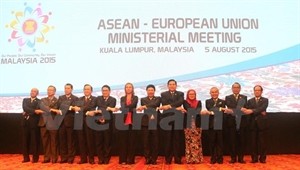
At the ASEAN-EU meeting. Photo: VNA
(VOVworld) - A series of meetings between ASEAN Foreign Ministers and the group’s 10 partners took place in Kuala Lumpur, Malaysia, on Wednesday. Deputy Prime Minister and Foreign Minister Pham Binh Minh has proposed initiatives to deepen ASEAN ties with 10 of its partners including China, the Republic of Korea, India, Russia, the US, the EU, Japan, Canada, Australia and New Zealand. He said priority should be on boosting connectivity; narrowing the development gap; and improving the capacity to cope with emerging threats such as trans-national crime, maritime security and safety, disaster management and epidemic prevention. Minh spoke highly of the partners’ support for ASEAN in its community building and maintenance of ASEAN’s central role in the region. He expressed concern over the ongoing complicated developments in the East Sea that have changed the status quo and seriously threaten peace, stability, maritime and aviation security and safety in the East Sea.
On behalf of Vietnam as a Country Coordinator of ASEAN-EU Dialogue Relations, Deputy PM Minh also co-chaired the ASEAN-EU Foreign Ministers’ Meeting and highly valued the positive progress of bilateral ties over the past three years with the first-ever informal ASEAN-EU Summit held in May 2014 as a key milestone. He called for pushing forward coordination across priority fields of trade, investment, connectivity, development gap narrowing and improving capacity to deal with non-traditional security challenges such as disaster management, climate change and anti-terrorism. The Deputy PM suggested devising a road map towards an ASEAN-EU strategic partnership and considering the organization of an ASEAN-EU Commemorative Summit in 2017 to mark the 40th anniversary of their dialogue relations.
Deputy Prime Minister Minh underscored the importance of quality infrastructure and balance between economic growth and environment protection in his speech to the eighth Mekong-Japan Foreign Ministers’ Meeting in Kuala Lumpur, Malaysia on Wednesday. He proposed the Mekong – Japan cooperation focus on the building of a feasibility study for a multi-mode transport route connecting the East-West Economic Corridor (EWEC) and the Southern Economic Corridor (SEC) with South Asia region. He called for increased coordination with the Mekong River Commission on assessing environmental impact caused by infrastructure projects, responding to natural disasters and climate change.
The same day, Deputy PM Minh and Republic of Korea (RoK)’s Minister of Foreign Affairs Yun Byung-se co-chaired the fifth Mekong – RoK Foreign Ministers’ meeting. In his speech, Minh stressed the significance of increased connectivity through hard and soft infrastructure in the sub-region, especially transport and logistics infrastructure on the EWEC and SEC. He called for continued collaboration in the management and sustainable use of water resources and other resources in the Mekong River. He highly valued the role of private sector and suggesting making good use of effective and practical mechanisms like the Mekong – RoK Business Forum.